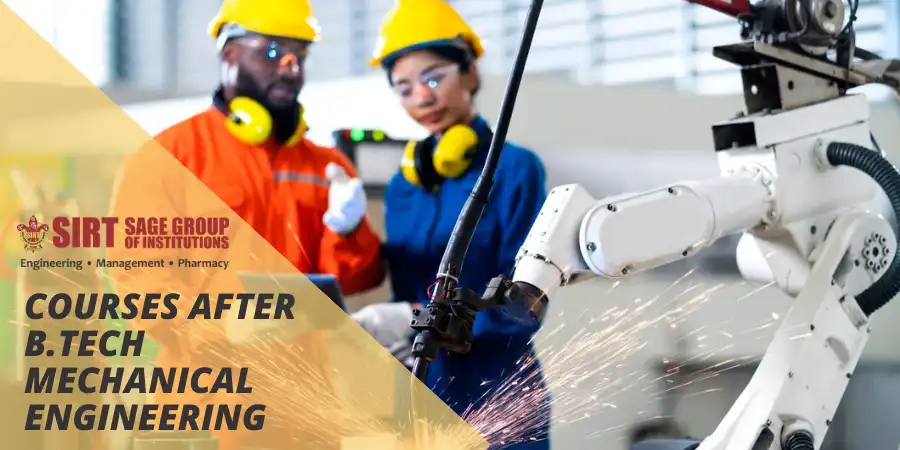A versatile field that unlocks abundant opportunities for any individual stepping into Mechanical engineering for a B.Tech degree. Continuous learning leads to growth, and thus the current industry demands continuous learning and upskilling to stay connected to matters at hand. To flourish in the field let’s explore the depth of mechanical engineering, its applications, and the top 10 courses one can pursue after completing B.Tech in Mechanical Engineering to enhance career prospects.
What is Mechanical Engineering?
A branch of engineering that applies principles of physics, mathematics, and material science for the design, analysis, manufacturing, and maintenance of mechanical systems is Mechanical Engineering. It plays a crucial role in various industries, contributing to the development of machines, engines, HVAC systems, and more.
Mechanical Engineers partake in diverse areas such as automotive engineering, aerospace engineering, energy systems, robotics, and material engineering. This field is exciting and ever-evolving through its multidisciplinary nature.
10 Top Job-Oriented Courses after B.Tech in Mechanical Engineering
1- Master of Technology (M.Tech) in Mechanical Engineering:
For those looking to deepen their knowledge and specialize in a specific area pursuing a master’s degree in mechanical engineering is a logical step. M.Tech programs offer advanced courses in subjects like fluid dynamics, thermal engineering, robotics, and materials science. A postgraduate degree enhances your expertise and opens up higher-level job opportunities.
2- Master of Business Administration (MBA) with a Specialization in Operations Management:
Combining a mechanical engineering background with an MBA in Operations Management equips individuals with the skills to manage production processes, supply chains, and overall operations efficiently. This course is ideal for those aspiring to take up managerial roles in manufacturing or service industries.
3- Certification in CAD/CAM (Computer-Aided Design/Computer-Aided Manufacturing):
CAD/CAM is integral to modern engineering design and manufacturing. Acquiring certification in CAD/CAM tools like AutoCAD, SolidWorks, or CATIA enhances your proficiency in computer-aided design and manufacturing, making you more employable in industries relying on these technologies.
4- Certification in Six Sigma:
Six Sigma is a set of techniques and tools for process improvement. By getting certified in Six Sigma, mechanical engineers can contribute to enhancing the efficiency and quality of processes in manufacturing or service organizations. This certification is highly valued by industries seeking continuous improvement.
5- Robotics and Automation Certification:
As industries increasingly adopt automation and robotics, a certification in robotics and automation provides mechanical engineers with the skills to design, implement, and maintain automated systems. This course is particularly relevant for those interested in advanced manufacturing and Industry 4.0.
6- Certification in Project Management:
Project management skills are vital for successful execution of engineering projects. A certification in project management equips mechanical engineers with the knowledge and techniques to plan, execute, and close projects efficiently, making them valuable assets to their organizations.
7- Diploma in Piping Design and Engineering:
Piping design is crucial in industries like oil and gas, petrochemicals, and power plants. A diploma in piping design and engineering provides specialized knowledge in designing and maintaining pipelines, enhancing career prospects in these industries.
8- Renewable Energy Courses:
With a growing focus on sustainability, courses related to renewable energy, such as solar or wind energy systems, are highly relevant. These courses enable mechanical engineers to contribute to the development and implementation of clean energy solutions.
9- Certification in Computational Fluid Dynamics (CFD):
Computational Fluid Dynamics is essential in analyzing fluid flow, heat transfer, and related phenomena. This certification equips mechanical engineers with the skills to simulate and optimize fluid dynamics, making it valuable in industries like aerospace, automotive, and energy.
10- Certification in Non-Destructive Testing (NDT):
Non-destructive testing techniques are crucial for evaluating the integrity of materials and structures without causing damage. A certification in NDT makes mechanical engineers adept at using techniques like ultrasonic testing, radiography, and magnetic particle testing, making them valuable in industries like manufacturing and construction.
Conclusion
Completing a B.Tech in Mechanical Engineering opens the door to a world of opportunities, but staying competitive in the job market requires continuous learning and skill development. The top courses for mechanical engineering mentioned above cater to various interests and career goals, providing mechanical engineers with the tools they need to thrive in the ever-evolving field of engineering. Whether one chooses to specialize further in mechanical engineering, venture into management, or explore emerging technologies, these courses ensure a well-rounded skill set and increased employability in a competitive job market. Embracing these opportunities for further education will undoubtedly pave the way for a successful and fulfilling career in the field of mechanical engineering.
FAQ Related B.Tech Mechanical Engineering
Q. What are the top courses to pursue after B.Tech in Mechanical Engineering?
A. The top courses to pursue after B.Tech in Mechanical Engineering include:
1- M.Tech in Mechanical Engineering
2- MBA in Operations Management
3- Master of Design (M.Des)
4- PG Diploma in Industrial Automation
5- M.Tech in Thermal Engineering
Q. Which MTech is best after mechanical engineering?
A. The best M.Tech specialization after completing Mechanical Engineering includes M.Tech in Mechanical Engineering (specializations like Design, Manufacturing, Thermal Engineering), Automotive Engineering, Robotics, and Industrial Engineering.
Q. Is B. Tech mechanical good for the future?
A. Yes, B.Tech in Mechanical Engineering is considered a good option for the future due to its broad applicability across various industries such as manufacturing, automotive, aerospace, energy, and robotics.



